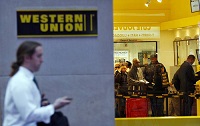 Seventy-six per cent of people in the UAE expect to remit more money internationally in the coming year, according to a study by money transfer company Western Union, The National News report.
Seventy-six per cent of people in the UAE expect to remit more money internationally in the coming year, according to a study by money transfer company Western Union, The National News report.
Six in 10 people picked family support as the primary reason for transferring money overseas, followed by 11 per cent who cited saving for the future, showed the survey, which polled more than 1,000 respondents in the UAE who send and receive cross-border money transfers.
“To remit is often a very personal decision. Our data also supports that one of the most common reasons why consumers remit is to support loved ones and family,” said Jean Claude Farah, president of the Middle East and the Asia-Pacific region at Western Union.
“So, it is only natural that as the global economic climate challenges affordable ways of living, family support takes precedence over everything else as senders move money.”
Remittance flows to low- and middle-income countries are set to increase by 5 per cent on an annual basis to $626 billion in 2022, despite global macroeconomic headwinds, with India expected to receive a record $100 billion this year, the World Bank said earlier this month.
However, the projected increase in remittances this year is lower than the 10.2 per cent growth recorded in 2021, the Washington-based lender said in its migration and development brief.
Global remittance flows to poor and middle-income countries grew to $589 billion in 2021, according to an earlier World Bank report.
The five most common destinations for remittances were India, China, Mexico, the Philippines and Egypt.
Meanwhile, 75 per cent of people in the UAE who receive money expect to collect even more funds over the next year, according to Western Union.
Furthermore, as increased living expenses and global currency fluctuations create additional pressure on personal finances, 74 per cent of those surveyed said they need to transfer more money because of higher cost of living in the country they send to, the survey showed.
Seventy-one per cent also said that they try to remit more money when the currency value falls in their receiving country.
Referring to the biggest drivers of money transfer flow and frequency, 34 per cent of respondents said they remitted money shortly after payday regardless of wider economic circumstances, while 32 per cent cited family needs back home.
“We also see an uptick of approximately 6 per cent in the volume of remittance transactions as festive seasons and special moments approach,” Mr Farah said.
About a quarter of consumers said they focused on sending money during festive occasions such as Ramadan, Christmas, New Year and Diwali, as well as other special occasions, such as birthdays, graduations and anniversaries, the survey found.
About 37 per cent of UAE consumers who receive money transfers said the frequency and amount is influenced most strongly by festive and other special occasions, followed by 27 per cent who picked family needs and 18 per cent who cited the timing of their sender’s paychecks, Western Union said.
While 42 per cent of respondents in the Emirates currently remit money exclusively through digital channels, 46 per cent said they wanted to be able to choose how they send their funds, whether in cash or digitally, in future, according to the study.
A similar sentiment was echoed among receivers. Forty-three per cent currently receive money through digital channels only and 57 per cent want to be able to choose between digital and retail channels when collecting their funds in the future.
Those who do not use digital channels said the top barrier preventing them from sending or receiving money online was their preference for face-to-face interaction, followed by trust. They also cited process or customer experience as a barrier.
“While most consumers can be considered digital-first, many ultimately want to able to choose between digital and retail options, based on their convenience and needs,” Mr Farah said.
“However, being able to trust in online services is critical and as an industry, we have work to do helping consumers overcome their concerns.” (NewsWire)
